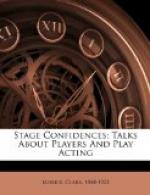In the first place, then, a theatrical company is almost exactly like one large family. Our feeling for one another is generally one of warm good-fellowship. In our manners there is an easy familiarity which we would not dream of using outside of our own little company circle. We are a socially inclined people, communicative, fond of friendly conversation, and hopelessly given over to jokes, or, as we put it, “to guying.”
But don’t imagine there’s any socialism about a theatre that means community of property and association; on the contrary, we enter into the keenest competition with one another.
I dare say an outsider, as the non-professional has been termed time out of mind, watching our conduct for a few days and nights, would conclude that, though quite harmless, we are all a little mad. For the actor’s funny habit of injecting old, old lines of old, old plays into his everyday conversation must be somewhat bewildering to the uninitiated:—
If an elderly, heavy breathing, portly gentleman, lifting his hat to a gentle, dignified little lady, remarks, “Beshrew me, but I do love thee still. Isn’t it hot this morning; take this chair.” Or if a very slender pop-eyed young comedian, while wiping his brow, says, “Now could I drink hot blood and hold it not a sin,” and some one else calmly answers, “You haven’t got those words right, and you couldn’t drink anything hot to-day without having a fit.” Or if two big, stalwart men, meeting in the “entrance,” fall suddenly into each other’s arms, with a cry of “Camille!” “Armand!” Or if a man enters the greenroom with his hat on, and a half-dozen people call, “Do you take this for an ale-house, that you can enter with such a swagger?” and the hat comes off with a laughing apology. Or if the man with the cane is everlastingly practising “carte and tierce” on somebody, or doing a broadsword fight with any one who has an umbrella. If a woman passes with her eyes cast down, reading a letter, and some one says, “In maiden meditation, fancy free.” If she eats a sandwich at a long rehearsal, and some one instantly begins, “A creature not too bright nor good for human nature’s daily food.” If she appears in a conspicuously new gown and some one cries, “The riches of the ship have come on shore,” ten to one she replies, “A poor thing, but mine own.”
These things will look and sound queer and flighty to the outsider, who, not acquainted with the lines or the plays they are from, cannot of course see how aptly some of them adapt themselves to the situation. But this one is plain to all. A young girl, who was a very careless dresser, was trailing along the “entrance” one evening, when behind her the leading man, quoting Juliet, remarked, “’Thou knowest the mask of night is on my cheek,’ or I would not dare tell you your petticoat is coming off;” a perfect gale of laughter followed, in which the little sloven joined heartily.
Then one morning, rehearsal being dismissed, I was hurrying away, intending to enjoy a ride on horse-back, when Mr. Davidge, Mr. Daly’s “old man,” lifting his hat politely, and twisting Macbeth’s words very slightly, remarked, “I wish your horse swift and sure of foot, and so I do commend you to its back,” and as I laughed, “Macbeth, Act III,” we parted in mutual admiration for each other’s knowledge of the great play.




